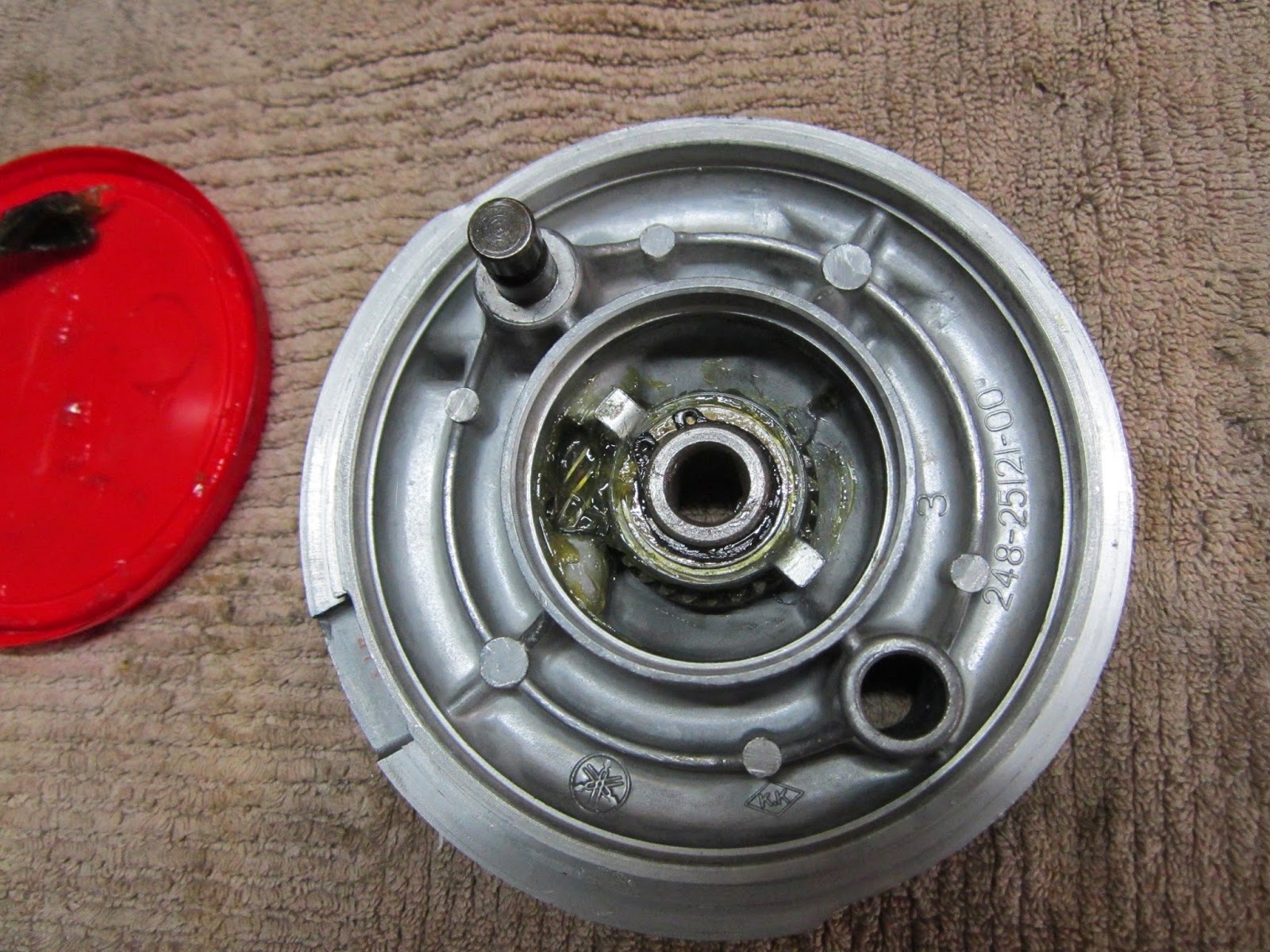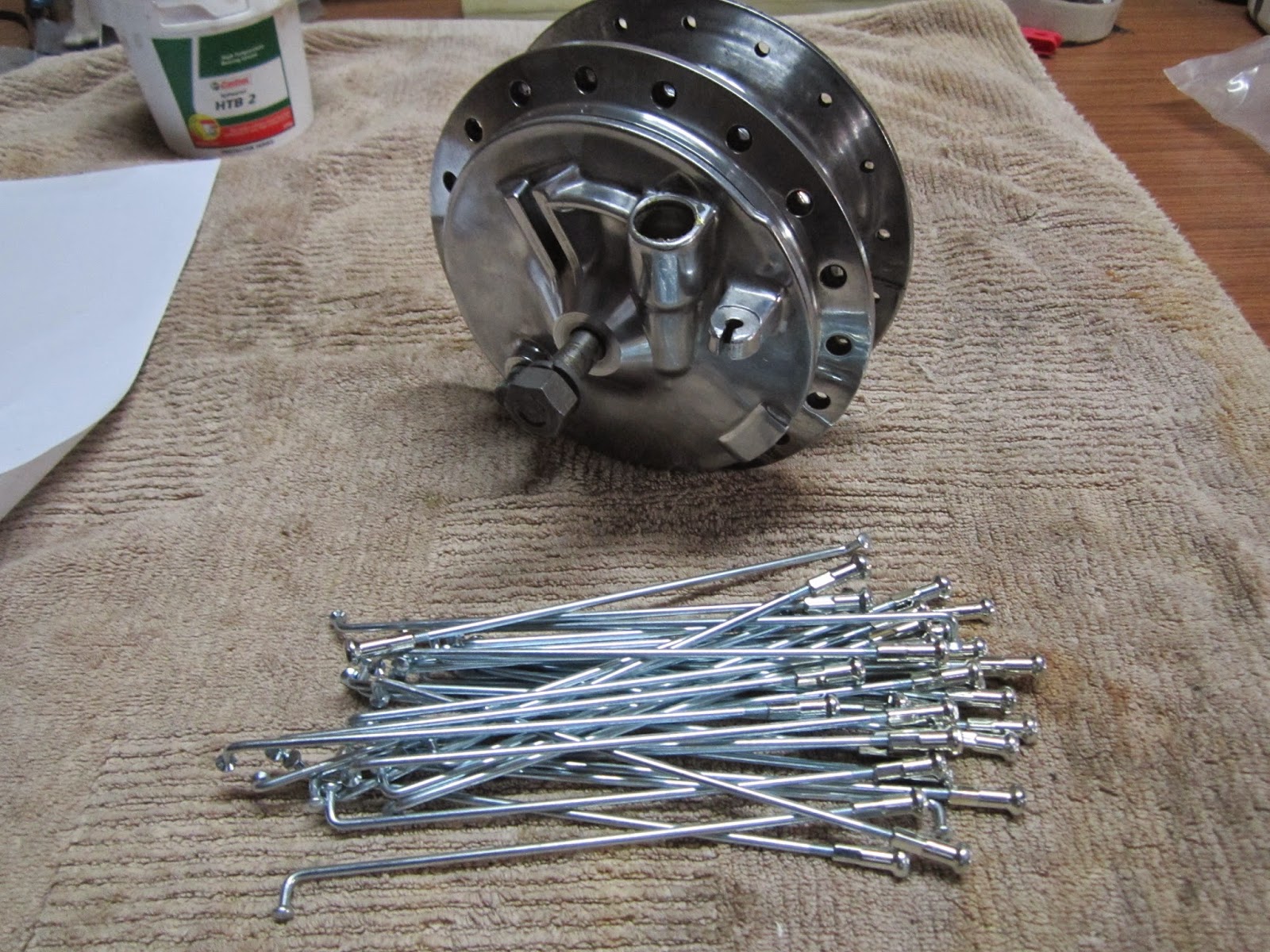After my first Nickel plating experiments I've changed a couple of things. First of all I bought a bigger glass baking dish so I could plate bigger stuff. I also swapped the iron tie wire for pure copper tie wire, it won't rust like the iron tie wire did after a while (contamination of the electrolyte). And I bought 2 meters of copper wire, stripped the insulation and all of a sudden I had 12 meter pure copper tie wire :)
Remember this is quality nickel plating
Without buying an expensive kit, just some cheap household products and a nickel welding rod.
 |
| Making copper tie wire |
Now I had to cook some more electrolyte. I still make it in the smaller jar because that seams to work well. The 100% pure nickel rods are now showing their abuse; pitted and getting thinner.
 |
| Wear out nickel rods |
After 5 batches or so I had enough to fill my bigger electroyte bath. I used another pure nickel welding rod as the new Anode. I bent it a bit so it would be over the whole height of the bath and to make it easier to connect it to the pos (+) wire of the phone charger..
 |
| Bigger electrolyte bath for nickel plating |
After a plating test with an old useless bolt I took the front brake lever of the bike and started the preparation. I think this is the most important step! Clean and smooth objects will give the best most shiny plating results. Always start with a general cleaning, scrubbing and wiping your piece with wax and grease remover. Next I dipped the lever for ca. 5 minutes in Hydrochloric acid (HCL), this will remove all the left over old zinc plating. It will also remove surface rust etc.
 |
| Hydrochloric acid for cleaning metal and removing zinc plating |
Best to do this outside because it bubbles like crazy and I think the fumes aren't too healthy...
Dipping zinc plated rear foot peg in Hydrochloric acid
Then I rinsed the to be plated part with water, dipped it for 3-5 minute in Deox-ionize, to prep it for the plating, now rinse again with water and put it in the electrolyte solution straight away before you get flash rust. Connect the copper tie wire withe the metal rod hanging above your bath. The first couple of times I connected the Neg (-) wire with the rod through a thin copper wire. It worked but later on I connected the Alligator clip directly to the metal rod and this improved the plating results. After 25 minute or so I took the lever out, rinsed it with water and polished it for a couple of minutes. Looking good!
 |
| Front brake lever Yamaha LS3 being nickel plated |
 |
| Nickel plated front brake lever Yamaha LS3 |
 |
| Nickel plated front brake lever and polish alu hub Yamaha LS3 |
The next day I started polishing some stuff after the cleaning/preparation cycle but before plating. After polishing I repeated the whole cleaning and dipping preparation cycle. It made a big difference. It looks better and I've read that the nickel will bond better if the to be plated surface is smooth. It's pretty hard to catch the plating results but believe me it's looking good!
 |
| rear foot peg Yamaha LS3 before plating |
 |
| Nickel plated rear foot peg Yamaha LS3 |
 |
| Nickel plated rear foot peg Yamaha LS3 1972 |
 |
| Nickel plated rear foot peg Yamaha LS3 |
 |
| Springs and other parts middle - and side stand |
 |
| Nickel plated springs and bolts middle - and side stand |
 |
| Polished and unpolished nickel plated bolts tension bar Yamaha LS3 |
 |
| Tension bar Yamaha LS3 before plating |
 |
| Tension bar Yamaha LS3 before plating |
 |
| Polished nickel plated bolts and tension bar Yamaha LS3 |
 |
| Polished nickel plated bolts and tension bar Yamaha LS3 |
 |
| Polished nickel plated bolts and tension bar Yamaha LS3 |
The tension bar I nickel plated didn't fit in my electrolyte bath so I did it in two steps. You absolutely cannot see the overlap. It looks like it has been plated in one go.
 |
| Nickel plating in two steps |
I also nickel plated the wire adjuster of the autolube pump. It was rrrrrrrusty, if you take a closer look you can still see some light pitting.
 |
| Rusty Autolube pump wire adjuster |
 |
| Nickel plated Autolube pump wire adjuster |
 |
| Adjusting bolt an nut |
 |
| Nickel plated adjusting bolt and nut |
After a couple of days the metal rod above the electrolyte bath started to discolour, the vinegar acid must have bitten it ;) So I replaced it with a piece of copper pipe which is also better for the current flow.
And because I read that the optimum working temp for a nickel bath is around 55 C I went to a charity bargain market last Saturday morning and bought an old but working stainless steel BBQ plate for 2 dollar.
 |
| Heating-the Nickel plating electrolyte |
Another thing I did was filtering the electrolyte. I used an old plastic coffee filter with a paper filter inside.
 |
| Filtered Nickel plating electrolyte |
Before plating I now wet sand the parts with 600/800-1200-1500 grit. I know it's a bit fiddly but if you want good results it's worth the extra couple of minutes work.
The plating results are even better than before. After a light buff it's a mirror finish.
 |
| Pan head screw - engine cover - before DIY Nickel plating |
 |
| Nickel plated pan head screws engine cover Yamaha LS3 |
 |
| Nickel plated pan head screws engine cover Yamaha LS3 |
 |
| Nickel plated bolt engine |
 |
| Mirror finish DIY Nickel plated bolt |
 |
| Rear wheel shaft, sprocket shaft, collars |
 |
| Nickel plated Rear wheel shaft, sprocket shaft, collars Yamaha LS3 |
 |
| DIY Nickel plated sprocket shaft Yamaha LS3 1972 |
Another thing that I plated were a couple of new Yamaha bolts I ordered for the brake and clutch levers. The original chrome bolts were quite rusty and pitted. But when I received the "original" bolts they looked totally different, only the size was right. First of all they weren't chrome plated but zinc plated, secondly there was a number (6 or 9) on top. They call it "superseded" what means that the original part has been replaced by a useable newer/better part, I learned this the hard way... Yuk, they really looked like simple construction bolts from your local hardware store.
So I took one of those superseded bolts, dipped it for a minute in hydrochloric acid and carefully grinded the top smooth. Then I sanded the head with 600-1200-1500 grit sandpaper and nickel plated the bolt.
Looks way better, very close to the original chrome plated bolt.
 |
| Superseded, modified and original bolt Yamaha |
 |
| Superseded, modified and original bolt Yamaha |
Same thing with the cable adjuster bolts and nuts. The superseded ones have the same shape as the original ones but were painted black (poor paint job) instead of being zinc or chrome plated.
 |
| Superseded cable adjuster nut and bolt Yamaha |
So I dipped them in hydrochloric acid for 10-20 seconds (that was enough to remove all the paint).
Removing the black paint with Hydrochloric acid
20 minutes in a Nickel bath did gave them the finishing original touch.
 |
| Plated cable adjuster nut and bolt Yamaha |
 |
| Nickel plated cable adjuster nut and bolt Yamaha |
For more info about preparation see:
http://yamaha-ls3.blogspot.com.au/2015/03/preparation-motorcycle-parts-before-diy.html























































